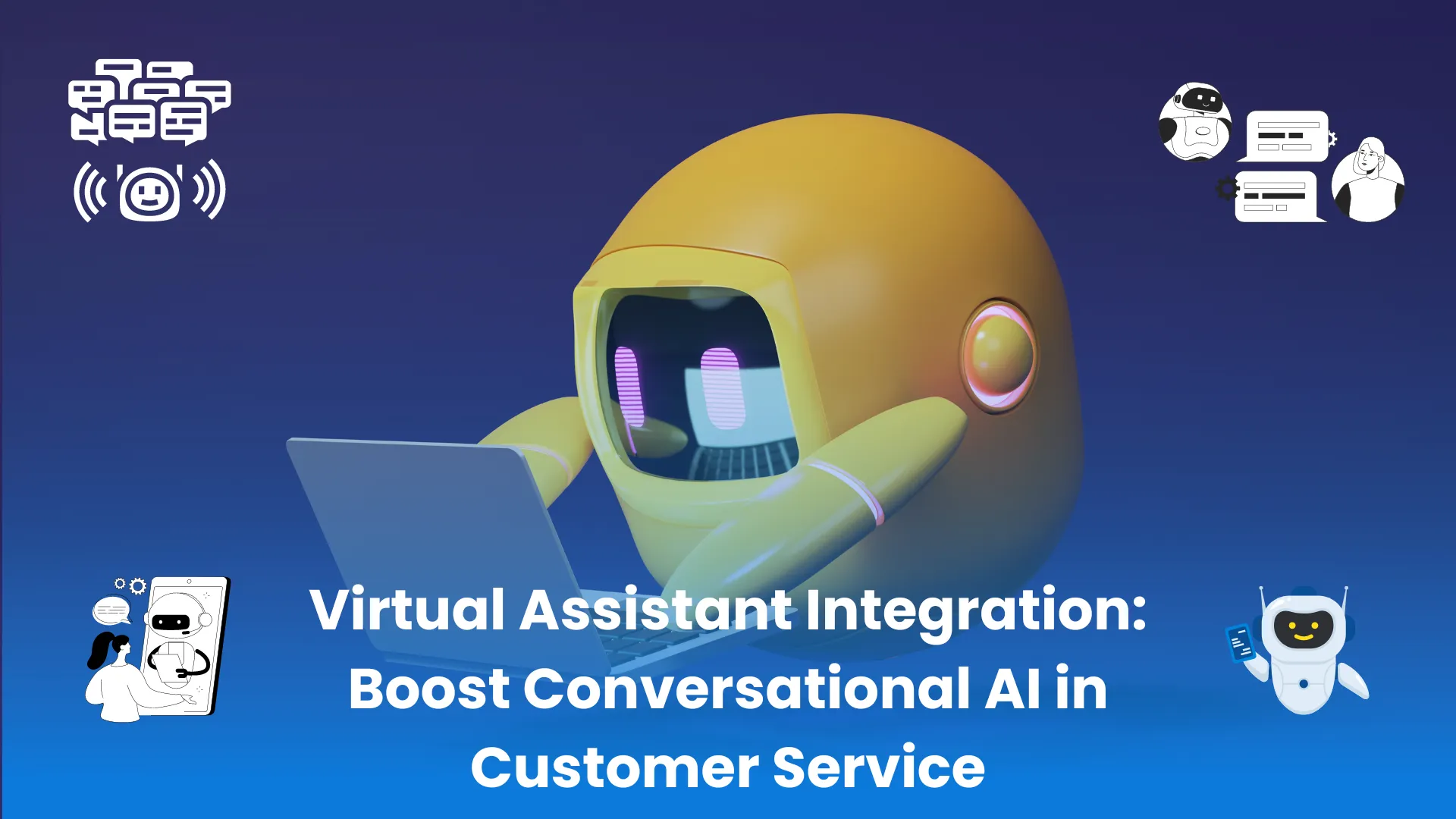Table of Contents
What exactly defines an AI Supporter?
An AI Helper, sometimes referred to as AI Digital Assistant, is software empowered by Artificial Intelligence that crafts personalized human-like responses in text or speech by leveraging natural language understanding.
The AI supporter is blending analytics and cognitive computation, drawing upon distinct user or client data, previous discussions, and location details, all while tapping into the organization’s knowledge repository and human comprehension.
How exactly does an AI Supporter Function?
AI Helpers leverage advanced AI technologies including natural language understanding (NLU) and Expansive Language Models (ELMs). NLU serves as the cornerstone of any AI supporter, enabling it to comprehend and respond to inquiries with human-like responses, thereby facilitating natural interaction.
Let’s begin by clarifying and attaining a deeper understanding of the prevalent AI terminology associated with AI virtual assistants.
AI Supporters are Empowered by Conversational AI?
Conversational AI is a demonstration of Artificial Intelligence (AI) through the emulation of dialogue with human users. They adhere to automated protocols and employ capabilities termed natural language understanding (NLU), and machine learning (ML). Collaborating, these advancements enable chatbots to process data and respond to various commands and requests.
A conversational AI platform is propelling the world with remarkable levels of automation that drive productivity upward for service teams and expenses downward. New advancements in AI technology are elevating today’s traditional chatbots to advanced AI supporters.
Merits of AI Supporters
Augmenting Workplace Efficiency
AI supporters significantly enhance workplace productivity by assuming control of routine and repetitive tasks. This automation enables human employees to focus on more intricate and impactful assignments, fostering an environment where creativity and strategic thinking take precedence. The outcome is not only heightened efficiency but also a more motivated workforce, leading to heightened productivity levels.
Economies through Automation
By automating various customer service functions, virtual assistants diminish the need for extensive human labor, resulting in substantial cost savings. This optimization of resource allocation is critical for businesses aiming to streamline operations and enhance their bottom line, without sacrificing service quality.
Continuous Customer Service
AI supporters are accessible around the clock, ensuring that customer inquiries are attended to at any hour, day or night. This perpetual availability significantly enhances the customer experience, delivering timely and consistent support. It instills a sense of dependability and confidence, which is indispensable for cultivating strong customer relationships and nurturing loyalty.
Improving Customer Experience
The instantaneous response capability of AI virtual assistants not only addresses customer needs efficiently but also enhances overall satisfaction. By providing prompt and accurate support, businesses can markedly enhance their customer service, resulting in improved customer retention and loyalty. This 24/7 support system ensures that businesses are consistently available for their customers, fostering a positive and enduring customer experience.
Chatbot versus Conversational AI in Customer Service for AI Supporters
The landscape of conversational technology has witnessed a notable evolution from basic rule-based chatbots to sophisticated Conversational AI systems. Early chatbots operated by matching user queries to predefined responses through pattern-matching techniques, lacking the ability to grasp context or engage in fluid conversations.
AI Digital Assistants versus Chatbots
Data-driven and predictive chatbots are also referred to as virtual assistant chatbots, AI Virtual Personal Assistants, Virtual Support Agents, AI Voice Aides, AI-powered Chatbot Helpers, or Digital Assistants (Digital Workers).
Apple’s Siri and Amazon’s Alexa are examples of consumer-oriented virtual assistant AIs, data-driven, predictive AI chatbots. They are considerably more advanced, capable, personalized, and sophisticated than the straightforward task-oriented variety, thus enhancing the customer experience.
Conversational AI Assistant or enterprise Chatbot is a context-aware chatbot, employing natural language understanding (NLU), NLP, and ML to acquire new knowledge while operating. They can also employ their predictive intelligence and analytics capabilities to personalize conversational flows and responses based on user profiles or other available information.
An AI supporter can even recall a user’s preferences and offer solutions and recommendations, or even anticipate the person’s future needs, as well as initiate conversations. In summary, AI-powered virtual assistants enabled with AI technology can unite single-purpose chatbots under one umbrella.
The Virtual Assistant technology can extract information from each chatbot and aggregate it to answer a question or execute a task, with AI assistance always maintaining appropriate context.
AI Voice Assistant and Distinctions with AI Text Assistant
AI vocal assistants and AI Text Aides are two embodiments of AI technology that streamline human-computer interaction, including virtual assistant integration and conversational AI in customer service.
Voice-activated virtual assistants or vocal virtual assistant services like Amazon’s Alexa or Apple’s Siri utilize an AI voice robot with speech recognition technology to interpret and respond to spoken prompts and vocal interaction, contributing to virtual assistant AI integration. They convert spoken commands or vocal inquiries into actions, providing hands-free convenience ideal for multitasking or accessibility purposes.
On the other hand, AI Text Aides such as Conversational Aid, or virtual agents use leverage to understand and respond to written prompts. They are widely employed in chatbots and AI customer care bots, assisting in tasks such as email drafting and instant messaging.
The fundamental difference lies in their mode of communication: while vocal assistants are auditory and speech-based, text assistants are visual and text-based. This differentiation arises from various user needs, contexts, and preferences, ultimately shaping the diverse AI application landscape. However, both technologies are evolving towards a more conversational and natural human-computer interaction, driving the need for VA integration and conversational AI for customer service.
AI Personal Virtual Assistant Integration
AI Personal Assistants are advanced software programs that utilize artificial intelligence to carry out tasks, enhancing productivity, virtual assistant including integration and conversational AI in customer service. They may employ AI-powered text assistants, Vocal Assistants, or both.
They can function akin to an executive assistant, but they are powered by Natural Language Processing (NLP) and Machine Learning (ML) algorithms to comprehend and respond to user commands, improving over time for a personalized experience. With ongoing advancements in voice data, they are increasingly becoming indispensable tools in our daily routines and digital transformation processes, contributing to virtual assistant integration and conversational AI in customer service.
All of us have encountered at least one of the personal virtual assistant AI examples below:
- Apple Siri: Apple’s Siri is among the popular virtual personal assistants. Siri is an AI-powered digital assistant available on iPhones, iPads, and Mac devices. It enables users to execute various tasks using voice commands, such as setting reminders, sending messages, making calls, and searching the web. Siri also integrates with other apps and services on Apple devices, delivering a seamless and personalized user experience.
- Amazon Alexa: Amazon Alexa is a renowned virtual assistant found in devices like Amazon Echo speakers. It can carry out a wide range of tasks, including playing music, providing weather updates, controlling smart home devices, ordering products from Amazon, and answering general knowledge questions. Alexa’s capabilities can be expanded through third-party integrations, making it a versatile and customizable virtual assistant.
- Google Assistant: Google Assistant is accessible on Android devices and smart speakers like Google Home. It offers a diverse range of features, including voice-controlled search, personalized recommendations, smart home control, scheduling reminders, and accessing information from various Google services. Google Assistant is recognized for its natural language processing capabilities for text and speech recognition and its ability to understand context for more conversational interactions.
The Role of AI Assistants in Various Industries
AI virtual assistants are revolutionizing various sectors, including:
Healthcare:
LLMs in healthcare are extensively utilized nowadays. Conversations AI is used for scheduling appointments, reminding patients to take medication, and even offering basic health advice. They can also analyze patient data to provide personalized care, contributing to virtual assistant integration and conversational AI in customer service.
Banking:
Utilizing generative AI in the banking sector, as an AI assistant is also very common now. with account inquiries, transaction alerts, and fraud detection. They also provide financial advice based on users’ spending habits.
Education:
Digital assistants help personalize the learning experience, provide learning resources, and answer student queries. They also assist teachers in grading and administrative tasks.
Best AI Assistant for Enterprise
The era of AI assistants is here, transforming our interactions with technology in profound ways. When it comes to the best AI assistants for enterprise, Aisera Shines. Aisera delivers an AI Service Management (AISM) solution that leverages advanced Conversational AI and automation to provide an end-to-end Conversational AI Platform. These advanced AI capabilities automate tasks, actions, and workflows for ITSM, HR, Facilities, Sales, Customer Service, and IT Operations.
Ethical Considerations in the Use of AI Assistants
AI assistants, while offering numerous advantages, also come with some challenges, including virtual assistant integration and conversational AI in customer service. Despite advancements in AI, virtual assistants can still struggle with complex tasks and may require human intervention. Additionally, there can be a lack of personal touch that only humans can provide.
One of the main concerns is privacy. AI assistants often require access to sensitive data to function effectively, which may pose a risk if not properly managed. It’s essential that adequate security measures are in place to protect this data and that users are made aware of how their data is used.
Moreover, as AI virtual assistants often learn and adapt from interactions, they may unintentionally reinforce biases present in the data they are trained on. This highlights the need for robust and unbiased training data.
As AI assistants become more advanced, they will be making more decisions on behalf of humans. This brings up questions about responsibility and accountability. For instance, who is to blame if an AI assistant bot makes a mistake or causes harm?
To ensure the responsible use of AI assistants, a combination of clear regulations, transparency from AI developers, and informed users is necessary. Developers should strive to create AI that respects users’ privacy, values, and rights. Users, on the other hand, need to be informed about the capabilities and limitations of AI assistants and how to use them responsibly. The reliability of the company providing the virtual assistant is a key factor to consider.
The Future of AI Assistants (Digital Assistants)
As we embark on a journey of continuous innovation and exploration within the realm of AI, the future of digital assistants appears remarkably promising. Anticipate groundbreaking advancements such as heightened emotional intelligence and automatic speech recognition, paving the way for more intuitive and seamless interactions with virtual assistants. Picture conversations with AI evolving to become more nuanced, understanding context and intricacies with unprecedented accuracy. Moreover, expect a significant leap in personalized experiences, with AI-powered virtual assistants becoming adept at not only understanding our preferences but also adapting to our evolving habits and routines, providing tailor-made assistance like never before.
Increased Autonomy and Adaptive Learning
As AI continues to evolve, brace yourself for virtual assistants that exhibit even greater autonomy, seamlessly learning from past interactions to anticipate and execute tasks without explicit instructions. Imagine a virtual assistant that proactively anticipates your needs, taking proactive steps to assist you based on your past behaviors and preferences. This increased autonomy promises to revolutionize the way we interact with technology, ushering in an era of unparalleled convenience and efficiency.
Enhanced Personalization and Tailored Experiences
The future of AI-powered virtual assistants holds the promise of enhanced personalization, offering tailored experiences that cater to individual preferences and requirements. These virtual assistants will not only recognize patterns in our behavior but also adapt their responses and recommendations accordingly, ensuring that every interaction feels uniquely tailored to our needs. Whether it’s providing personalized recommendations, scheduling tasks based on our routines, or offering proactive assistance, AI-powered virtual assistants will redefine the concept of personalized service.
Conclusion: Embracing the Future with ProtopVA
As the landscape of artificial intelligence and virtual assistant technology continues to evolve, businesses are faced with the imperative to adapt and innovate to stay ahead of the curve. In this dynamic environment, the integration of virtual assistant technology emerges as a critical driver of success, enabling businesses to enhance productivity, streamline customer service, and deliver exceptional experiences to their customers. At the forefront of this transformation stands ProtopVA, offering innovative solutions tailored to the unique needs of modern enterprises. With expertise in conversational AI and virtual assistant integration, ProtopVA empowers businesses to leverage cutting-edge technology to thrive in an ever-evolving digital ecosystem.
Take the Next Step: Book a Call with One of Our ProtopVA Experts to Get Started
Ready to embark on a transformative journey towards harnessing the power of AI assistants for your business? Reach out to one of our experts today to explore personalized solutions tailored to your unique requirements. Let ProtopVA be your trusted partner in navigating the complexities of AI integration and driving success in the digital age.



